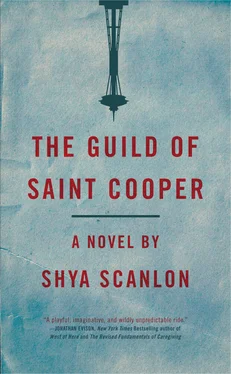JOSIE HADN’T GONE TO college. She’d married Happy, her high school boyfriend, after learning she was pregnant — this during the beauty contest whose outcome was trumpeted by the crown still on display — only to miscarry in her second trimester and fall into a long, near-fatal depression. Though her prize carried with it a partial scholarship to Western Washington University, an overlooked contingency required the “half-ride” to be ridden within two years, which she missed, sending her back into a tailspin not weeks after she’d finally emerged from her depression long enough to get her application paperwork together and submit.
We sat on her front porch, and I listened to her story over coffee and homemade biscotti while waiting for Blake to pick me up. It was a little uncomfortable, both because of the story and because I was distracted, looking down the street for Blake’s car, and could feel Josie’s acute sensitivity to these glances. I wanted to apologize for them, to tell her not to interpret them to mean I wasn’t fully invested in the conversation — except that’s exactly what they meant.
“Well,” I said, “you didn’t miss much.”
Josie rolled her eyes. “Oh, come on, you must have liked something about your first year.”
She bribed me with another biscotti, and I bit.
“There was one class,” I acknowledged. “It was about self-deception.”
A pickup truck drove slowly down the street. It was painted red and yellow and had some kind of bird logo painted on the passenger-side door.
“It was about the different ways you can deceive yourself. We read Freud and a guy named Habermas, some other guys.”
“So what is it?”
“Self-deception? It’s basically the ability to hold two opposing beliefs at the same time. For some reason this was always represented by the letter P. As in, P and not-P.”
I could tell Josie was trying to think of an example, so I gave her one.
“Say you’re an alcoholic, I mean you’re really addicted, and you know this, or part of you knows it. But at the same time, you tell yourself you’re in control.”
“Okay.”
“But it gets more interesting on a bigger scale, maybe. Like global warming. There’s all this evidence to support it, and it’s basically a fact, right? But there are tons of people out there who come up with all these crazy reasons why it’s not true. I mean, they know it’s true, part of them, but they’ll also believe anything that contradicts it.”
Josie seemed ruminative.
“It’s about being driven, for whatever reason, away from unpleasant truths. Like if there’s some kind of personal responsibility at stake. Or a moral imperative you’re trying to escape.”
We were quiet for a time. I wanted to finish my coffee, but a thin film of cream had developed on the cooling liquid’s surface. I heard the hollow knock of wood on wood, and through the screen door I could see Alice sitting beside a simple puzzle, its oversized wooden pieces scattered on the floor.
Another car came down the street. Josie stood and began to gather up the dishes. Her fingernails, I noticed, were bitten down to the quick.
“You’re right,” she said. “I’m not missing much.”
On the way to Queen Anne, Blake explained the change of plans. We’d decided to go to Discovery Park, where during high school we’d analyze ourselves on walks as circuitous and interminable as our conversations. But since Kent had apparently confessed to spilling the beans, she’d decided to address the matter directly.
“I just want you to see for yourself that he’s not a creep,” she said.
“An FBI agent hanging around an eighteen-year-old girl? How could that possibly be creepy?”
Blake accelerated through a yellow light.
“Listen, Dale is important to me, okay? Be nice.”
What kind of a name is Dale, I wondered. It sounded Southern, small, like the name of a cattle rustler. Or a cowhand. Dale Evans. Dale Earnhardt. Chip n’ Dale. I wasn’t jealous, really. Though I’d been hoping for sex two days ago, my feelings for Blake were roughly platonic — she could be fucking the mayor for all I cared. But that didn’t mean I wasn’t judgmental. I didn’t like the idea of her with an older man the same way I wouldn’t like the idea of her with Kent. It was aesthetic more than anything.
We circled up the hill and crossed a small bridge spanning a ravine on the north side, then parked on a slight incline. Blake’s ’70s Chevy’s doors were heavy, and we had to work to keep them open as we climbed out. I followed her up the block and down a street, and when it became apparent that we hadn’t parked anywhere near Dale’s house, I voiced my dissent.
“Driveway full?”
“Dale is a cautious man.”
We walked on. It was not a neighborhood I’d spent much time in, and I gazed wonderingly at the large, stately brick houses nestled behind formidable oak trees lining the street. Their gnarled roots propped up slabs of sidewalk so that we had to step up occasionally, though we were not climbing. It seemed reasonable to ask whether his caution was due to their difference in age or to his work in some way, but I didn’t ask. Either way, it put me on edge. Blake turned down a driveway to a small communal area in the center of the block, a large lawn flanked by pea patches, and we cut across, slipping through a fence and down to the basement door of a modest white house. She opened the door without knocking, and we entered.
The rec room was done in masculine hardwood and forest green. In the center was a pool table with deep red felt, home to a thin layer of dust; the balls had been racked at one end, and at the other a cue ball sat in the saturated red field like the tip of a bone. We climbed up a tight stairwell that cut back twice in the span of one floor and emptied out into a bright white kitchen. Everything was immaculate here, and gave the impression of long disuse despite the lack of dust. A muted voice could be heard from another room, and as I followed Blake down a hallway toward the front of the house it grew louder, until I could recognize it as the stern singsong delivery of radio news.
We paused at the doorway to the living room. Across from us stood a man leaning over a large table — the only piece of furniture out of place — with his left arm raised, index finger extended. Just a minute .
“You’ve brought Blake along,” the man announced. His voice was even and almost clipped, but entirely without menace. “He’s one hundred and fifty-five, maybe one hundred and sixty pounds, with a pronate gait, and favors his right side.”
Blake, who was standing before me, looked back up at me, eyes wide. The newscaster was speaking about the Seattle Lights, and in the minutes we waited for Dale, I learned that more had been seen, that hotels were booked as believers the world over poured into the city. A barista, interviewed about increased business, said, “At least we know the aliens’ intentions are good. I just hope they don’t want a cut of the proceeds.”
Dale turned around, a big grin on his open face, and walked directly to me with his hand held out. He was dressed in a simple black suit, white shirt, and a red-white-and-blue, diagonally striped tie. His slicked hair was combed back in an almost ’50s style. He had soft brown eyes, a strong chin, and a tall, narrow face bearing no blemish or wrinkle whatsoever. He looked much younger than his age, though he was certainly twice ours. We shook.
“I had a dream last night,” he told me, “and I’m hoping you can help me understand it.” I looked past him to the table he’d been standing over, and without following my gaze he said, “Pendulum clocks.”
Читать дальше












